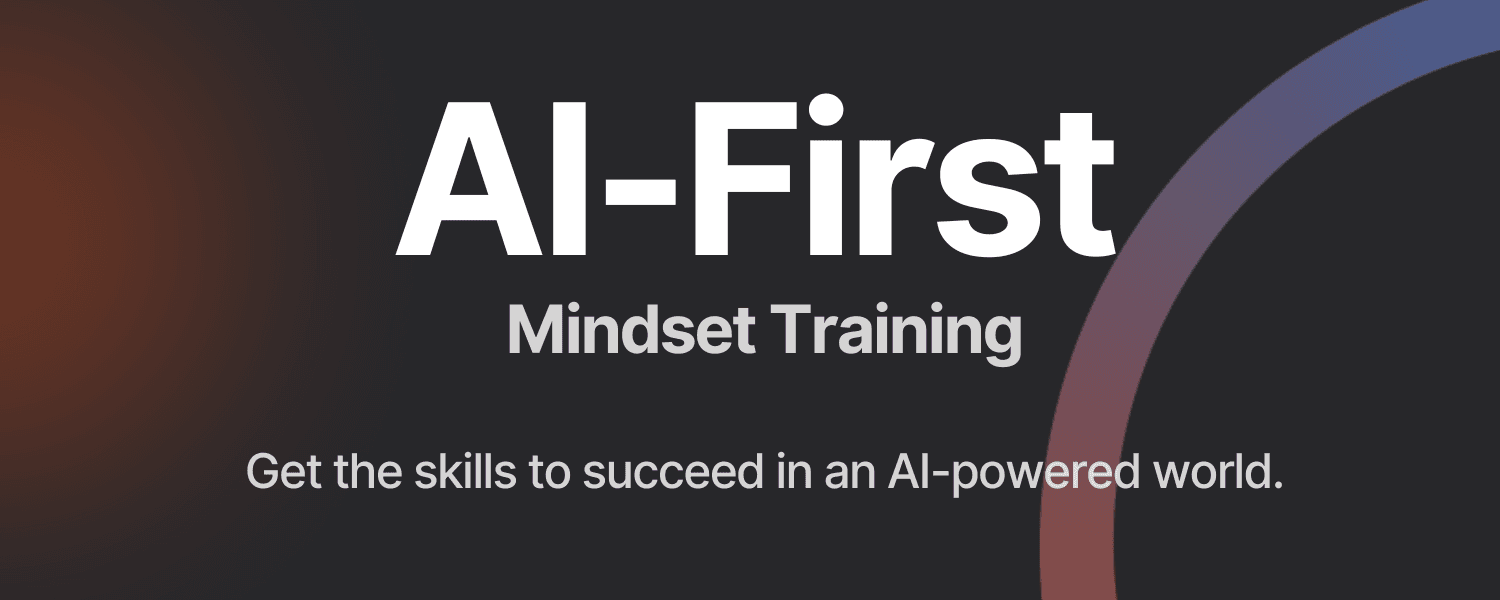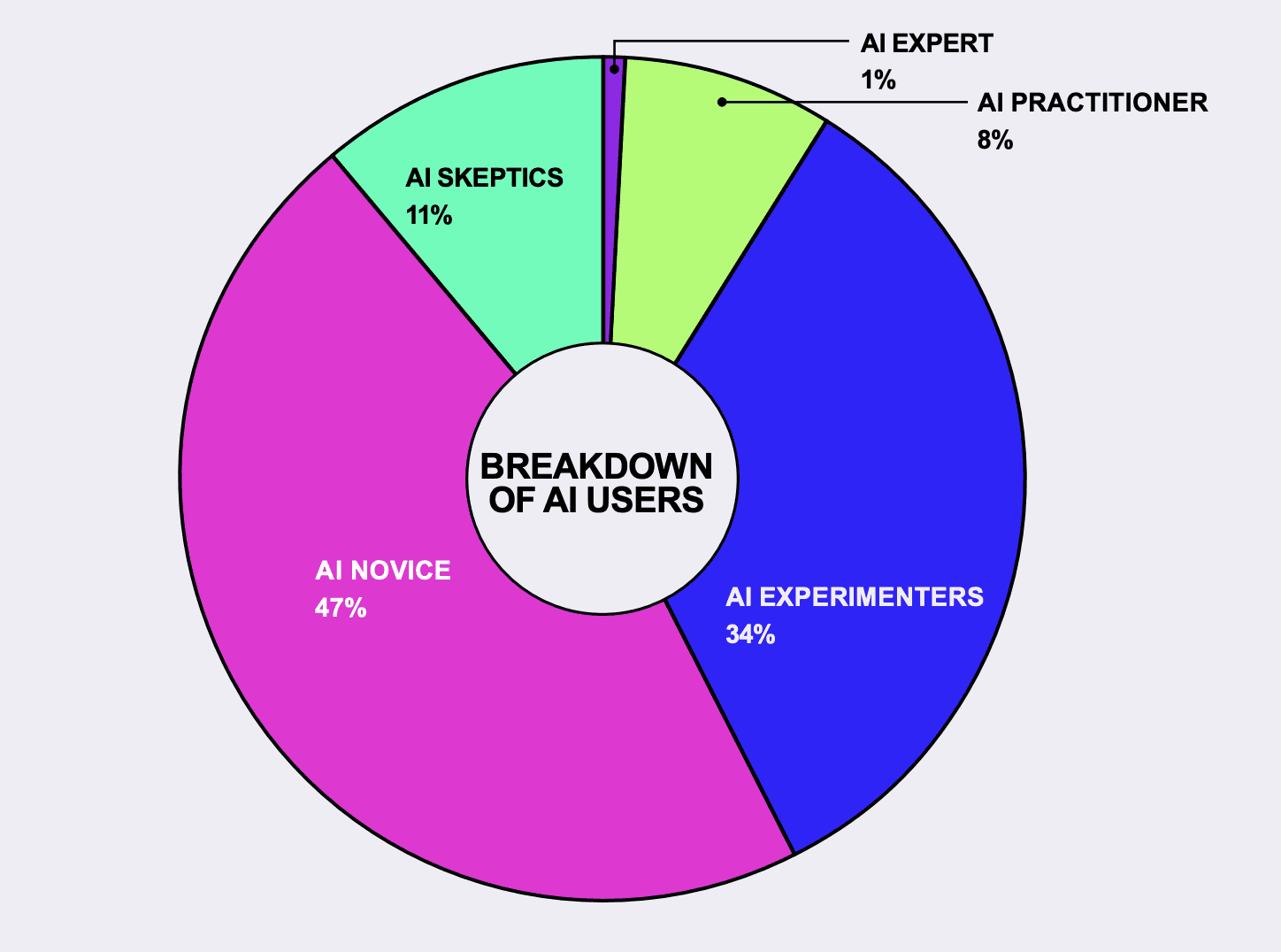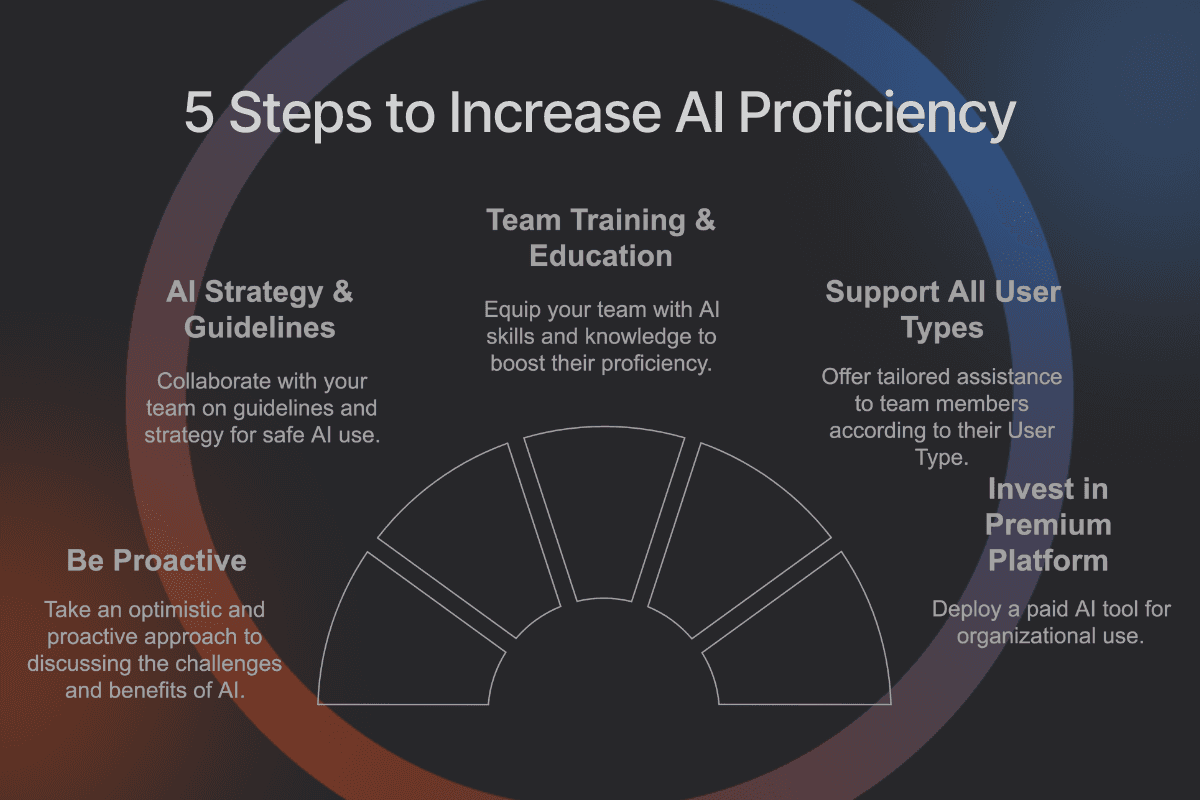AI Proficiency Report: Why AI Education is Critical for 2025
Dec 19, 2024
The key to success in 2025? Boosting your team’s AI Proficiency.
AI is disrupting the workplace, helping employees get more done, faster.
However, research shows workers are anxious and overwhelmed by AI, and not using it to its full potential.
Business education platform Section conducted extensive research about AI at work.
The AI Proficiency Report reveals the truth about how people use AI in the workplace today.
One thing is clear - companies who invest in AI training and education will enjoy massive time savings and higher revenue and performance.

In this article, we’ll discuss the 5 AI User Types identified in the report and explain how you educate your team about AI in 2025.
How Section gathered AI proficiency data
Section interviewed 5,003 knowledge workers from the US, UK, and Canada.
Participants came from a broad scope of industries and job functions.
The researchers gave each participant a proficiency score according to the three criteria:
AI Usage — Participants provided information about what they use AI for, what tools they use, and how valuable they perceive it.
AI Knowledge — Questions to test knowledge of AI’s capabilities and risks.
Prompting capabilities — Participants had to create prompts for different scenarios, and AI scored the quality of their prompts.
Each participant received an overall score and was ranked as one of the 5 AI User Types.
The 5 AI User Types
Section’s report splits AI users into five categories: Skeptics, Novices, Experimenters, Practitioners, and Experts.

Source: AI Proficiency Report, Section
Let’s take a look at each User Type:
Skeptics
12% of the workforce are AI skeptics who hardly ever use AI and don’t believe it can positively impact their work.
92% are anxious and overwhelmed by AI.
79% don’t trust its contributions.
99% have only used free models.
62% are in companies that ban or don’t comment on AI use.
Skeptics have poor prompting skills, and most work for companies that either ban AI or do nothing to educate their employees about it.
Novices
The most common type of AI user is the Novice, who uses AI occasionally but hasn’t bought into its potential or seen any benefits yet.
Novices make up 46% of the workforce.
79% are anxious or overwhelmed about AI.
Only 21% are excited about its implications for them.
77% have received no training, and 74% don’t have access to paid tools.
This group has low prompting skills, and many work at companies that are indifferent to AI or ban it altogether.
Experimenters
34% of participants were Experimenters, who have a more optimistic outlook about AI.
89% trust it to support their work.
47% would be disappointed to lose access.
34% use AI several times a week.
44% rank it among their top 3 productivity tools
Despite the positives, many Experimenters are still overwhelmed by AI and only have basic prompting skills.
This group also worries about the “unspoken consequences” of using AI in their work, including the fear of being caught out or having their jobs automated.
Less than a third of Experimenters have received AI proficiency training from their company.
Practitioners
Practitioners make up 8% of the workforce and are excited about the future of AI at work.
95% trust AI to support them in their work
Practitioners use free and paid AI tools several times a week.
They claim to save around 10% of their time thanks to AI.
89% work in supportive companies with AI-positive policies, but less than a third have received company AI training.
Practitioners have moderate prompting skills but lack knowledge about the risks of AI.
Experts
AI Experts represent 1% of the workforce. They are using AI for different purposes across all aspects of their work.
100% of Experts use paid models several times a week
100% said they trusted AI’s contributions completely
30% said they saved at least 8-12 hours per week using AI.
Experts scored an average grade of 80% in prompting skills
42% have received AI training, and 93% have buy-in from employers or managers to use AI at work.
Experts have the potential to make the most significant revenue-driving impact because they can effectively use AI to automate low-value tasks.
Why AI Proficiency matters
This report shows that AI proficiency is linked to time savings and employee confidence at work.
Workers with higher AI proficiency reported saving hours a week thanks to AI. They also appear to have a more optimistic outlook about AI, while Skeptics and Novices are held back by their lack of skills, fear, and overwhelm.
The average expert claims to be getting back nearly a day and a half of their workweek thanks to AI.
AI proficiency matters because - like it or not - we are heading for an AI first world. Business have to grapple with the reality that AI use is widespread, and companies who don’t have positive, forward-think AI policies and training will be left behind.
How leaders can increase AI Proficiency
You can boost your company’s revenue and productivity by adopting a positive mindset and offering AI education to your workforce.

1. Take a proactive approach
A third of AI Novices work for companies that are silent about AI.
Silence leads to fear and anxiety in your organization. Team members may assume AI is prohibited. They won’t ask questions or share ideas about using AI with their colleagues, as they’re afraid of repercussions.
Employees may also fear that AI will replace them, so avoid introducing it into their work.
The first and most important step is to start a dialogue about AI with your team.
Encourage team members to ask questions, discuss their fears and excitement, and share ideas about how AI could be used to improve workflows.
2. Create clear AI strategy and guidelines
Company leaders must get together to outline a company AI strategy.
Your AI strategy should focus on how to adopt AI at the company level to increase revenue and productivity.
Take your team members ideas and suggestions into consideration. You can also be inspired by how they are already using AI.
Ensure the company’s AI policy and guidelines are clear and easily accessible for all your employees.
You will likely need to refresh your guidelines often as new tools and features become available.
3. Train and educate your team
The report shows that education is vital to get the most value out of AI.
It’s no coincidence that employees who receive training are more likely to score higher proficiency in AI.
We recommend investing in a comprehensive training program custom-designed to help your team achieve tangible results and save time through AI.
AI Operator offers tailor-made, hands-on training to help your team adopt the AI-first mindset.
We also help you develop custom automations and AI tools to win back time and increase employee satisfaction.
4. Learn how to help each AI User Type
Understanding the 5 AI User Types and where your team members rank on the scale can help you develop guidelines and training that work for your organization.
Each AI User Type has different needs, for example:
Skeptics need encouragement and favorable AI policies to help them overcome their mistrust of AI.
Novices and Experimenters need prompt training and access to premium tools to develop their skills.
Practitioners would benefit from learning about AI ethics and safety to increase their confidence.
Experts should be invited to advise on company AI strategy and support their peers by sharing their AI use cases.
5. Deploy a paid AI platform
Most skilled AI users have access to a paid model.
While it's good to experiment with free versions, you must invest in a paid model—such as ChatGPT premium—to see meaningful results.
If you have budget concerns, remember that investing in tools is a trade-off. Premium AI tools have more capabilities and higher limits, which result in faster growth and cost savings in the long run.
Increase AI Proficiency in your company for 2025
Imagine employing a team of AI Practitioners and Experts - confident AI users with excellent prompting skills who save time and enhance their work by using AI to its full potential.
At AI Operator, we’re here to make that a reality.
We craft a custom training program to help your team members embrace AI and learn how to use it to maximize their full potential.
We’ll empower your team to drastically reduce the time spent on mundane tasks and free up time for high-cognitive work.
Learn more about how our AI-First Mindset Training can transform your team in 2025.











